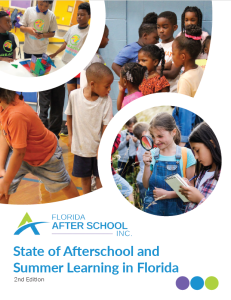 Florida After School, Inc. released its second edition of the ‘State of Afterschool & Summer Learning in Florida‘ Report in October 2024. This is an essential read for anyone invested in the future of Florida’s youth. With data-driven insights and compelling stories, this report sheds light on the persistent gaps in afterschool program availability across the state, despite efforts to grow programs post-pandemic. It highlights how afterschool deserts continue to limit the potential of many children and youth. The report also explores the critical role high-quality programs play in boosting school attendance, reducing risky behaviors, and promoting academic progression—issues that are even more urgent today.
Florida After School, Inc. released its second edition of the ‘State of Afterschool & Summer Learning in Florida‘ Report in October 2024. This is an essential read for anyone invested in the future of Florida’s youth. With data-driven insights and compelling stories, this report sheds light on the persistent gaps in afterschool program availability across the state, despite efforts to grow programs post-pandemic. It highlights how afterschool deserts continue to limit the potential of many children and youth. The report also explores the critical role high-quality programs play in boosting school attendance, reducing risky behaviors, and promoting academic progression—issues that are even more urgent today.
Florida After School, Inc. brings together a powerful network of advocates, educators, and professionals to tackle these challenges head-on. This edition offers readers a comprehensive overview of the state’s afterschool landscape, pairing data analysis with real-world success stories from communities that have made intentional investments in high-quality afterschool programs. These examples showcase what is possible when we prioritize and invest in the future of our children, and they offer a blueprint for other communities to follow. Now more than ever, it’s time to deepen our commitment to expanding and improving out-of-school time opportunities across Florida.
Recommendations
Now more than ever, it is time for Florida to focus on public policy that improves community and student health, safety, education and well-being. We must convene business leaders, policymakers, program providers and parents to thoughtfully create an afterschool system that provides youth a safe and enriching place to go when the school day or school year ends:
• Develop requirements for registration and oversight protocols for summer learning providers to help parents navigate summer learning experiences.
• Create a dedicated Summer Learning Scholarship funding stream for students at greatest risk of school failure.
• Increase public, corporate and local investments in afterschool and summer learning programs.
• Strengthen partnerships at the local, regional and state-level between school districts and community-based programs.
• Increase the number of ‘out-of-school time’ programs that have implemented the Florida Standards for Quality Afterschool Programs and completed the Florida Quality Self-Assessment & Improvement Guide.
